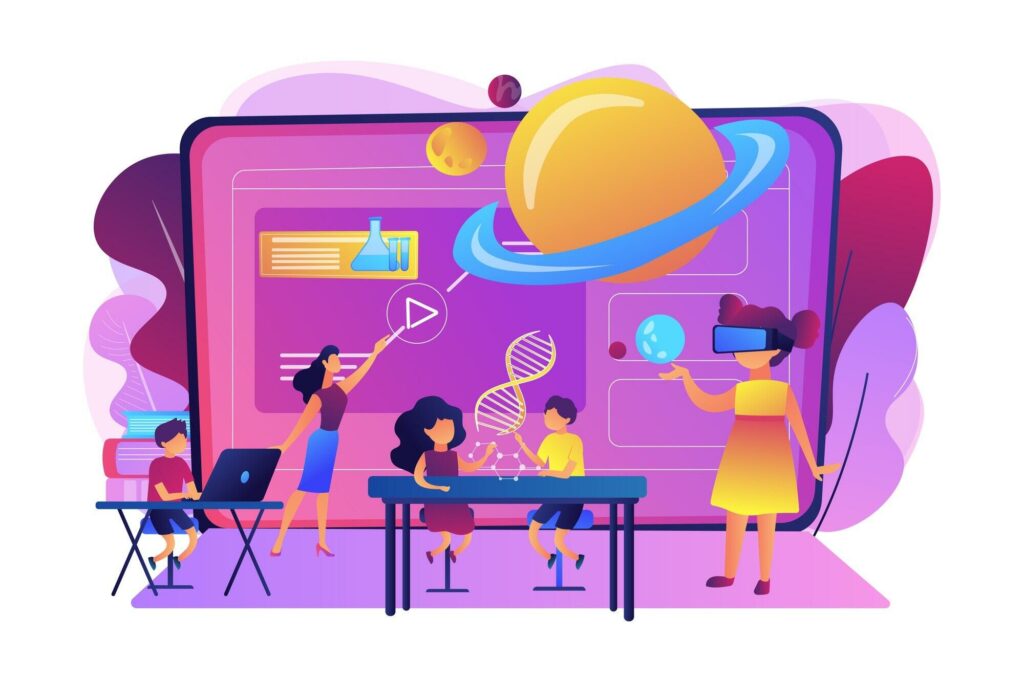
AI CERTS
6 months ago
AI Teaching Technology Training: Revolutionizing Education
In recent years, AI teaching technology has rapidly evolved, bringing significant advancements in the way educators deliver instruction and how students engage with learning materials. As artificial intelligence continues to impact various sectors, its influence in education has become increasingly evident, transforming classrooms, online learning platforms, and personalized education experiences. AI teaching technology training equips educators with the necessary skills to integrate AI tools and platforms into their teaching methods, improving both efficiency and educational outcomes.
Why AI Teaching Technology Training:
In this article, we will explore the importance of AI teaching technology training, its benefits, key applications in education, and how it is shaping the future of learning.
We will also provide insights into the challenges that come with adopting AI in teaching.

The Role of AI in Modern Education
AI is reshaping education by introducing technologies that can handle repetitive tasks, personalize learning, and provide data-driven insights. The goal of AI teaching technology is not to replace teachers but to augment their capabilities, allowing them to focus on higher-order tasks such as critical thinking, problem-solving, and fostering creativity in students.
Here are some key ways AI is influencing education:
1. Personalized Learning
AI enables personalized learning experiences by analyzing students' progress and learning patterns. Based on the data, AI systems can create tailored learning paths that adapt to each student’s pace and level of understanding. This allows students to receive content suited to their individual needs, promoting better retention and understanding.
For instance, platforms like DreamBox and Smart Sparrow use AI algorithms to adapt lessons and provide real-time feedback based on a student’s performance. This personalization ensures that no student is left behind, and high-achievers can progress faster.
2. Automation of Administrative Tasks
One of the biggest benefits of AI teaching technology is the automation of administrative tasks such as grading, attendance tracking, and lesson planning. AI systems can grade multiple-choice tests, analyze written assignments, and even detect plagiarism. This reduces the workload for teachers, allowing them to spend more time on lesson development and student engagement.
AI-powered tools like Grammarly and Turnitin are examples of technologies that help educators manage administrative tasks efficiently.
3. AI-Powered Tutoring Systems
AI-powered tutoring systems provide personalized support for students outside the classroom. These systems use natural language processing (NLP) to engage students in interactive learning sessions, offering explanations, answering questions, and providing guidance. This form of AI tutoring allows for constant, personalized attention that complements traditional teaching.
Examples of AI tutoring systems include Socratic by Google, which helps students with homework by offering explanations and solutions based on images or queries.
4. Learning Analytics
AI is also playing a significant role in learning analytics, helping educators track and evaluate student performance through data analysis. AI tools can gather and analyze large sets of data from student activities, providing insights into learning trends, problem areas, and engagement levels. This data-driven approach allows educators to make informed decisions about curriculum adjustments, intervention strategies, and resource allocation.
For instance, platforms like Knewton provide analytics that help teachers understand how well students are grasping the material and offer suggestions on how to improve teaching methods based on that data.
The Benefits of AI Teaching Technology Training
To effectively integrate AI into educational environments, teachers and administrators need to undergo AI teaching technology training. This training is essential for developing the skills needed to use AI tools effectively and make data-driven decisions that enhance learning experiences.
Here are some of the key benefits of AI teaching technology training:
1. AI Teaching Technology Training Enhance Teaching Efficiency
Training in AI teaching technology helps educators automate repetitive tasks, allowing them to focus on creative and impactful teaching strategies. By learning how to use AI-powered grading tools, automated lesson planners, and attendance trackers, teachers can streamline their workflow and dedicate more time to student engagement.
2. AI Teaching Technology Training Improve Student Engagement
With the ability to provide personalized learning experiences, AI can significantly improve student engagement. Training enables teachers to harness AI tools that adapt lessons to suit different learning styles, increasing student interest and participation.
3 Real-Time Feedback and Assessment
AI-driven systems offer immediate feedback to both students and teachers, enabling real-time assessments that inform instructional decisions. Teachers can quickly identify which students need additional support and adjust their teaching strategies accordingly.
4. Data-Driven Insights
AI teaching technology training equips educators with the knowledge to interpret learning analytics. By analyzing data on student progress, engagement, and challenges, teachers can tailor their approaches to maximize learning outcomes.
External Resource: For more insights on how AI can enhance teaching, read Harvard Business Review's article on AI in higher education.
Key Challenges of AI in Education
While the benefits of AI in teaching are vast, there are challenges to consider when implementing AI teaching technology.
1. Data Privacy Concerns
AI systems often require access to large amounts of student data to function effectively. This raises concerns about data privacy and the security of sensitive information. Educational institutions must ensure that AI technologies comply with data protection regulations like GDPR and FERPA.
2. Teacher Resistance to Change
Adopting AI teaching technologies can be daunting for educators who are unfamiliar with advanced tools. Teacher resistance to technological change may slow the adoption of AI, making training and professional development essential.
3. Inequality in Access
Not all schools have the resources to implement AI technologies, leading to potential inequality in access to advanced educational tools. Schools in underserved areas may struggle to adopt AI due to limited infrastructure, budgets, or training opportunities.
External Resource: Explore the The future of learning: AI is revolutionizing education

The Future of AI Teaching Technology
The future of AI teaching technology holds promise as it continues to evolve and expand its applications in education. From AI-powered virtual classrooms to intelligent tutoring systems, AI is poised to redefine the way educators teach and students learn.
1. AI-Enhanced Virtual Classrooms
AI will play a crucial role in enhancing virtual classrooms, enabling more interactive and immersive learning experiences. AI tools can assist with real-time assessments, track student engagement in online discussions, and provide personalized feedback in virtual learning environments.
2. Adaptive Learning Systems
AI will continue to drive the development of adaptive learning systems that respond to student needs in real-time. These systems will not only personalize learning paths but also adjust the difficulty of materials based on student performance, ensuring optimal learning for each individual.
3. AI-Driven Lifelong Learning
As AI becomes integrated into educational systems, it will contribute to lifelong learning by offering adults flexible and personalized learning options. AI teaching technology will allow professionals to continually update their skills through online courses, adaptive learning platforms, and AI-driven assessments.
AI teaching technology is revolutionizing education by enhancing personalized learning, automating administrative tasks, and providing data-driven insights. As AI continues to evolve, educators must undergo AI teaching technology training to stay ahead of the curve and leverage these tools effectively.
By equipping themselves with the necessary skills, educators can ensure that their students benefit from the innovations AI offers, creating a more engaging, efficient, and personalized learning experience.